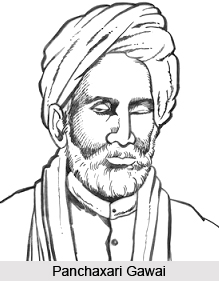 Panchaxari Gawai is a famous personality in the field of classical music. Just about the same time as Sawai Gandharva was born at Kundgol, a blind boy was born on February 2, 1892 at Kaadshettihalli, a village in Hangal Taluka of Haveri District. The boy`s blindness did not hinder his musical achievements. The boy was Gaddigeyya who later attained fame as Panchaxari Gawai. Gaddigeyya was a born singer. He used to sing Bhajans, folk stage-songs and other songs melodiously. Not only that. He could, with great skills, play on many a percussion instrument like Tabla, Mridanga, Karadi, Sambhaala. For all of which he was popular in the surrounding villages.
Panchaxari Gawai is a famous personality in the field of classical music. Just about the same time as Sawai Gandharva was born at Kundgol, a blind boy was born on February 2, 1892 at Kaadshettihalli, a village in Hangal Taluka of Haveri District. The boy`s blindness did not hinder his musical achievements. The boy was Gaddigeyya who later attained fame as Panchaxari Gawai. Gaddigeyya was a born singer. He used to sing Bhajans, folk stage-songs and other songs melodiously. Not only that. He could, with great skills, play on many a percussion instrument like Tabla, Mridanga, Karadi, Sambhaala. For all of which he was popular in the surrounding villages.
Early Years of Panchaxari Gawai
It was a time when the winds of Hindustani music were blowing in the Karnataka. Gramophone records and Marathi Dramatic Troupes popularized it no end. Already an adept in Carnatic Music, Panchaxari Gawai longed to learn Hindustani classical music of modern India as well. He bought a gramophone and learnt to sing along with its discs. At the end of his concerts, audiences would request him to sing along with gramophone discs and would present him gold rings.
Music for Panchaxari Gawai
Hindustani musicians like Abdul Karim Khan, Abdul Wahid Khan, Natthan Khan, Rehmat Khan, Vilayat Hussain Khan, Vishnu Digambar Paluskar, Bhaskarbuwa Bakhale, Ramkrishnabuwa Vaze, Alladiya Khan, Manji Khan, Keshavrao Bhosle, Balkrishnabuwa Ichalkaranjikar, Neelkanthbuwa Mirajkar would descend on Hubli to perform. To listen to them, Panchaxari Gawai would come down to Hubli from Shivayogamandir in Badami taluk of Bagalkot district. Panchaxari Gawai wished to learn North Indian Classical music from a guru.
Whatever Panchaxari Gawai wished for, Kumarswamiji would immediately translate into action. He invited from Lahore Abdul Wahid Khan, maestro of Kirana Gharana to Shivayogamandir to teach Panchaxari Gawai. The training lasted from 1917 to 1921. Panchaxari Gawai`s hunger for knowledge was not satisfied. For sometime he learnt from Ramkrishnabuwa Vaze and Inayat Hussain Khan. While at Mumbai for H.M. V. recording, he turned the opportunity to good use, called on Vinayakrao Patwardhan, Narayanrao Vyas, Master Deenanath, Omkarnath Thakur, Master Vasant, Manji Khan, Bhurji Khan, Kesarbai Kerkar, Moghubai Kurdikar at their homes, requested them to sing and observed each one`s specialties. Panchaxari Gawai had an intimate acquaintance with Abdul Karim Khan and Sawai Gandharva. The fallout of all this was that Panchaxari Gawai`s singing was a blend of the excellences of several gharanas. He could sing with equal felicity Thumri, Gazal, Tappaa, Dhrupad. Apart from singing, he would play with expertise on the Tabla, Harmonium, Pakhawaj, Violin, Sarangi, Dilruba and Flute. His forte, however, was the tabla wherein he had the speciality of playing on the tabla with his left hand and on the duggaa with his right hand.
Contribution of Panchaxari Gawai
Panchaxari Gawai, with the blessing of Kumarswamiji, started a music school in Shivayogamandir, which was the first formal music school in South India. He spread music in the South in the same way as Vishnu Digambar Paluskar did in the North. The number of disciples went on growing. To meet the demand, a mobile music school also was started. Along with music, Panchaxari Gawai made arrangements for his disciples to learn Kannada language and Sanskrit literature. Such selfless service by Panchaxari Gawai earned kudos from poet D.R. Bendre, Vachana Pitaamaha F.G. Halakatti and the doyen of Kannada stage Sadashivrao Garud.Some of his disciples were Basavaraj Rajguru, Puttaraj Gawai, Siddharam Jambaldinni, Panchaxariswamy Mattigatti, Arjunsaa Naakod, Sheshadri Gawai, Chittargi Gangadhar Shastry, Mrityunjaya and Chandrashekhar Puranikmath.
Panchaxari Gawai was the first to set vachanas of shivasharanas like Basaveshwar, Allamaprabhu and Akka Mahadevi to classical tunes. Naadapriya shivanembaru was the first vachana he composed in raaga Puriyaa Dhanashri. He took his band of boy-disciples to Solapur in 1932 and gave the first ever public recital of Vachanas. The tradition that he set in motion has been burgeoning through Mallikarjun Mansur, Basavaraj Raj guru, Siddharam Jambaldinni, Panchaxariswamy Mattigatti, Sangameshwar Gurav and many others.
Honours and Achievements of Panchaxari Gawai
Panchaxari Gawai received many honours for his achievements. Ubhaya Gaayana Vishaarada, Sangeet Ratna, Sangeet Saamraat, Lalit Kalaa Pitaamaha, Gaanayogi, Bhoogandharva Chandra, Gaana Kalaanidhi, Sangeet Saagara, Sangeet Sudhaanidhi, Gaayanaachaarya, Ubhaya Gaayanaachaarya to name a few.
To make ends meet, he started a troupe in the year 1940 called "Kumaareshwara Kripaaposhita Naataka Sangha". It was also Known as Gawai`s Troupe. The troupe staged many religious, mythological, historical, social plays throughout North Karnataka.
On coming to know Panchaxari Gawai`s credentials, Bal Gandharva was mighty pleased and at the time of the last show, invited Panchaxari Gawai on the stage and honoured him by draping an embroidered shawl. Bal Gandharva learnt from Panchaxari Gawai some Carnatic kirtans dance. And, had Tyagaraj`s `marugelaraa oh raghawaa` translated into Marathi.
Death of Panchaxari Gawai
Panchaxari Gawai`s health failed. He breathed his last on June 11, 1944. His punyatithi is celebrated every year at Veereshwara Punyaashram, Gadag through a whole-night music festival. At several villages throughout Karnataka and the far-off Chennai and Bhopal, Panchaxari Gawai`s Punyatithi is observed and his memory kept alive.




















